
Nov 23, 2020 | Economic & Entrepreneurial Vitality, Education, Staying on Top, UpstateVibe365
 Upstate SC Alliance launches regional gateway to technical training programs
Upstate SC Alliance launches regional gateway to technical training programs
Although the coronavirus pandemic has slowed some areas of the economy, within many sectors, businesses continue to grow. A new Upstate initiative highlights those sectors and seeks to connect unemployed or underemployed individuals with short-term training programs that can place them in an in-demand career.
 The platform, Skill Up, is a one-stop shop for individuals to explore the earning potential, projected growth, and training programs available for an array of in-demand careers that can be obtained with 12 months or less of technical training. In many cases, financial support is available for these programs.
The platform, Skill Up, is a one-stop shop for individuals to explore the earning potential, projected growth, and training programs available for an array of in-demand careers that can be obtained with 12 months or less of technical training. In many cases, financial support is available for these programs.
Occupations on display range from information technology specialist to pharmacy technician to commercial truck driver — and, among the in-demand occupations featured on the site, there have been 46,899 job postings in the last 12 months, with an average earning potential for in-demand careers of $72,037.
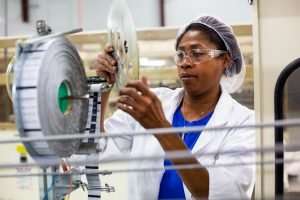 The platform was created by the Upstate SC Alliance in partnership with the Upstate’s technical colleges: Greenville Technical College, Tri-County Technical College, Spartanburg Community College and Piedmont Technical College.
The platform was created by the Upstate SC Alliance in partnership with the Upstate’s technical colleges: Greenville Technical College, Tri-County Technical College, Spartanburg Community College and Piedmont Technical College.
“Our goal is to inspire individuals to acquire new skills for better paying, more resilient in-demand jobs and connect people with programs available at the Upstate’s technical colleges that can launch their careers,” says Upstate SC Alliance President & CEO John Lummus.
 The site emphasizes training programs that can be completed in between two and 12 months, informed by Strada Education Network research.
The site emphasizes training programs that can be completed in between two and 12 months, informed by Strada Education Network research.
Strada finds that millions of American adults are aspiring learners, though two-thirds of those considering enrolling in education prefer non-degree pathways.
What’s more: fewer than one in three adults without degrees say they understand the available career pathways, valuable skills, and details about potential education programs “very well.”
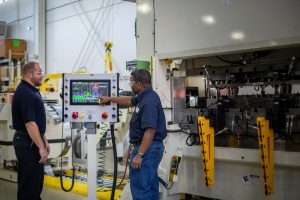 Skill Up is an extension of the Move Upstate SC website and brand, which were launched in 2019 to attract individuals to professional jobs in the Upstate.
Skill Up is an extension of the Move Upstate SC website and brand, which were launched in 2019 to attract individuals to professional jobs in the Upstate.
“The goal of Move Up has always been to connect employers and talent. And, the pandemic has presented an opportunity to address the skills gap by shining a light on those sectors that have remained resilient,” Lummus adds.
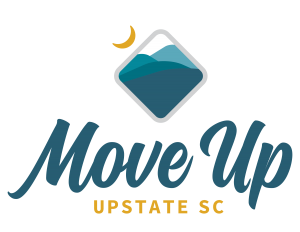 “Skill Up recognizes that the pandemic’s challenges may present an opportunity for some individuals to pursue new avenues. From hands-on manufacturing roles to network configuration to patient support, these careers have staying power and play an important role in our community.”
“Skill Up recognizes that the pandemic’s challenges may present an opportunity for some individuals to pursue new avenues. From hands-on manufacturing roles to network configuration to patient support, these careers have staying power and play an important role in our community.”
Explore Skill Up here: www.skillupsc.com
See more on Move Up here: https://moveupstatesc.com/

Nov 11, 2020 | Community Vibrancy, Education, Staying on Top, UpstateVibe365
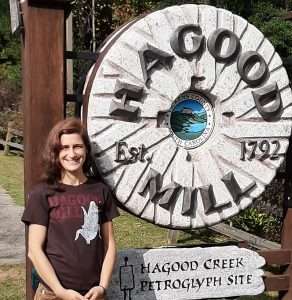
Katie Mann, Assistant Director, Hagood Mill
Every November the Hagood Mill Historic Site observes Native American Heritage Month by holding the Native American Celebration. Every Third Weekend of November we hold this beloved celebration that we also call Selugadu. Selugadu translates into cornbread in the Tsalagi Gawonihisdi (Cherokee) language. Selu, meaning corn and gadu, meaning bread. This celebration of cornbread is in reality a Harvest Festival. November is the time of year when Native Americans reaped the harvest of corn. All across the Americas the first people developed over 250 varieties of corn. Corn was an essential crop in Native American life and came to be in Colonial life as well.
At this time of year Americans Give Thanks. Join us at the Hagood Mill to give thanks to, and honor the first peoples of these lands, for the food traditions and customs that have influenced southern Appalachian life. On Saturday, November 21st we will bring together many people from many tribal groups to share their customs from today and yesteryear at the idyllic Hagood Mill Historic Site.
 Saturday’s event kicks off at 10 am and runs until 4 pm. We will have our typical Third Saturday activities, including the operation of the Hagood Mill, living history demonstrations and a cherry picked group of vendors. Visitors and guest performers will participate in the festivities of the day which will include: Native American traditional drumming, singing, dancing, flute playing, storytelling, Cherokee hymns in the Tsalagi Gawonihisdi language, and traditional crafts and demonstrations. Performers include storyteller and basket maker Nancy Basket, from Walhalla, SC; Cherokee singer Amy Sindersine of the Reedy River Inter-tribal Association; The Kau-Ta-Noh-Jrs Society Singers of the Tuscarora Nation, NC with On’yas Locklear, Raniya Locklear and Nawayla Locklear; and Keepers of the Word from South Carolina.
Saturday’s event kicks off at 10 am and runs until 4 pm. We will have our typical Third Saturday activities, including the operation of the Hagood Mill, living history demonstrations and a cherry picked group of vendors. Visitors and guest performers will participate in the festivities of the day which will include: Native American traditional drumming, singing, dancing, flute playing, storytelling, Cherokee hymns in the Tsalagi Gawonihisdi language, and traditional crafts and demonstrations. Performers include storyteller and basket maker Nancy Basket, from Walhalla, SC; Cherokee singer Amy Sindersine of the Reedy River Inter-tribal Association; The Kau-Ta-Noh-Jrs Society Singers of the Tuscarora Nation, NC with On’yas Locklear, Raniya Locklear and Nawayla Locklear; and Keepers of the Word from South Carolina.
Demonstrations of food-way traditions such as stone grinding of cornmeal, cooking fry-bread, and roasting corn will take place throughout the day. Barry Crawford’s prehistoric cooking demonstration using ancient soapstone bowls is too artful to be missed. Members from the Foothills Archaeology Society will be on site to identify Native American stone tools and artifacts. Be sure to bring your treasure to be identified!
 We will be inaugurating “Our Native Roots: An Interpretive Trail” at noon. The interpretive trail takes visitors along the Old Indian Path, which is an ancient trading path that took the Native Americans from the Mississippi coast and up and through the continental divide to Virginia. The interpretive trail includes a dugout out canoe which will be burned during the Native American Celebration, a river cane restoration area, a sacred fire circle for all to experience on this special day, a medicine wheel garden, a corn garden, a mortar and pestle for grinding corn, a prehistoric stone mortar, an archaeology adventure for kids, the Paul West artifact collection, and the petroglyphs that were made in prehistoric times. We are especially grateful to Paul West, who donated his personal collection of Native American artifacts, art and books to the Hagood Mill Foundation, and are now housed in the Hagood Creek Petroglyph Site.
We will be inaugurating “Our Native Roots: An Interpretive Trail” at noon. The interpretive trail takes visitors along the Old Indian Path, which is an ancient trading path that took the Native Americans from the Mississippi coast and up and through the continental divide to Virginia. The interpretive trail includes a dugout out canoe which will be burned during the Native American Celebration, a river cane restoration area, a sacred fire circle for all to experience on this special day, a medicine wheel garden, a corn garden, a mortar and pestle for grinding corn, a prehistoric stone mortar, an archaeology adventure for kids, the Paul West artifact collection, and the petroglyphs that were made in prehistoric times. We are especially grateful to Paul West, who donated his personal collection of Native American artifacts, art and books to the Hagood Mill Foundation, and are now housed in the Hagood Creek Petroglyph Site.
Due to COVID, we are limiting admission to this event. As a result, admission will be $10 per person 13 and up and $5 per child aged 3-12. One of our most popular events of the year, this event is sure to sell out, so get your tickets today.
 We will kick off the weekend on Friday, November 20th at the Heritage Pavilion! We have special free programming this year thanks to the Traditional Arts Touring Grant from South Arts. Beginning at 5:30 pm we will have an Artifact Show-and-Tell, in addition to workshops from some of the veteran performers of our Native American Celebration! There will be artifact experts on site helping folks to identify artifacts and to share stories. Nancy Basket will provide an educational workshop highlighting Native American basket making techniques, motifs, and the different types of construction materials which can be used based on one’s demographic location. On’yas Locklear and Ka-Tau-Noh-Jrs Society Singers will be offering song and dance workshops as well. Concessions will be available at 5 pm . Admittance to the Heritage Pavilion will be cut off at 150 people. Please bring PPE and your own chairs and bundle up! Arrive early to ensure your space. Of course observers are welcome to disperse in the fields surrounding the pavilion.
We will kick off the weekend on Friday, November 20th at the Heritage Pavilion! We have special free programming this year thanks to the Traditional Arts Touring Grant from South Arts. Beginning at 5:30 pm we will have an Artifact Show-and-Tell, in addition to workshops from some of the veteran performers of our Native American Celebration! There will be artifact experts on site helping folks to identify artifacts and to share stories. Nancy Basket will provide an educational workshop highlighting Native American basket making techniques, motifs, and the different types of construction materials which can be used based on one’s demographic location. On’yas Locklear and Ka-Tau-Noh-Jrs Society Singers will be offering song and dance workshops as well. Concessions will be available at 5 pm . Admittance to the Heritage Pavilion will be cut off at 150 people. Please bring PPE and your own chairs and bundle up! Arrive early to ensure your space. Of course observers are welcome to disperse in the fields surrounding the pavilion.
Make a weekend of the event and reserve your camping space as well!
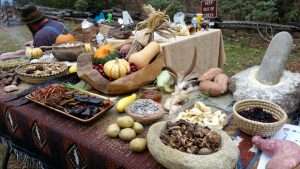 Primitive camping will be available Friday and Saturday nights– $10/person aged 13 and up for one or two nights (tent/car camping) or $30 for RV spaces. Limit 6 people per site. Car and RV spaces are limited, so register online soon. Folks with loud generators will be asked not to use them during special events.
Primitive camping will be available Friday and Saturday nights– $10/person aged 13 and up for one or two nights (tent/car camping) or $30 for RV spaces. Limit 6 people per site. Car and RV spaces are limited, so register online soon. Folks with loud generators will be asked not to use them during special events.
The Native American Celebration is partially funded by South Arts, Pickens County ATAX, and from generous donors like Paul West.
Visit our website for full event details and to access the ticket portal:
www.HagoodMillHistoricSite.com
Text GRITS to 85100 to stay in the loop of all things happening at the Hagood Mill and to receive exclusive offers.

Mar 25, 2020 | Education, Staying on Top, UpstateVibe365
by Catherine Schumacher, President & CEO, Public Education Partners
I’m writing this blog post from my home office, where I am enjoying one of the two benefits of working from home (the other being the dress code):  windows.
windows.
I never thought I would miss my windowless office at Public Education Partners so much. I took the quiet space, free of distractions, for granted. I took my brilliant and funny colleagues, the quick convenings in the hallway and the rather grim breakroom, for granted. Lots of things…taken for granted.
As our communities come together to respond to COVID-19 and its wide-ranging impact, all of us at Public Education Partners hope that there is one thing that no one will take for granted ever again: the essential role that public schools play in our society. Not just as places of learning, but as anchors of our communities.
Schools are, first and foremost, a safe space where our children learn to be educated, engaged, empathetic members of society. What we have seen in the last few weeks, however, is all of the OTHER things our schools do as well. Kids receive healthy meals that keep their bodies strong and minds sharp. They turn to school-based health centers to receive medical care and mental health supports. Families are connected to a broad network of social service providers that help with everything from homelessness to job training.
All from one, chronically underfunded system.
Our school districts–our teachers, counselors, principals, staff, administrators, and superintendents–are superheroes. As Greenville County Schools Superintendent Dr. Burke Royster observed in this op-ed published last week in the Greenville News, the efforts to transform learning and other support for our students on a very short timeframe are nothing short of “heroic.”
In Greenville County alone, we have 81 different locations where the district is providing not only two meals per day for students, but also free wi-fi access so that kids who don’t have it at home can download new content to their school-issued Chromebooks, submit assignments to teachers, and continue learning. Special education teachers, counselors, and school social workers are all keeping a close eye on their students, checking in just as they would if schools were in session as usual. These efforts are being replicated at districts across the Upstate, and they powerfully demonstrate the ways in which public education is about so much more than academics.
 Public Education Partners of Greenville County is proud to serve as co-facilitator with Ten at the Top of the Upstate Education Spectrum, which convenes key stakeholders to discuss critical needs in education that impact our Upstate Counties. Over the last year, we have been focusing on the teacher shortage, working together to develop strategies for recruiting and retaining the best teachers for our Upstate classrooms—inviting them to #TeachattheTop.
Public Education Partners of Greenville County is proud to serve as co-facilitator with Ten at the Top of the Upstate Education Spectrum, which convenes key stakeholders to discuss critical needs in education that impact our Upstate Counties. Over the last year, we have been focusing on the teacher shortage, working together to develop strategies for recruiting and retaining the best teachers for our Upstate classrooms—inviting them to #TeachattheTop.
The Teach at the Top brand was developed in partnership with our friends at Duke Brands and will be the heart of collaborative messaging about the benefits of teaching in the Upstate. Like PEP’s #Teach864 campaign, Teach at the Top will celebrate the terrific work of teachers and schools in our communities. Keep an eye out for news from #TeachattheTop on social media platforms in the weeks to come—now is the perfect time to shine a bright spotlight on these superheroes among us.
I also want to ask our Upstate community to keep a close eye on how we can support our public schools, teachers and administrators, and the students and families that they serve over the next several weeks. In particular, our Upstate United Ways are helping to coordinate strategic supports for children and families during this time. Public Education Partners will be doing everything that we can to be a good partner to Greenville County Schools, our colleagues at Ten at the Top, and others as we navigate this crisis. I invite you to follow us on our social media platforms (@PEPGreenville) and website for critical information relating to COVID-19, along with updates about our own programming.
Be well. Stay safe. Thank a teacher.

Public Education Partners (PEP), founded in 1985, leads our community in acting collectively to support, strengthen, and advance public education and student achievement in Greenville County Schools. To that end, its work focuses on Elevating Teachers, Empowering Advocates, and Engaging Communities.

Jun 12, 2019 | Community Vibrancy, Education, Staying on Top, UpstateVibe365
Roper Mountain Science Center is a great place to visit no matter when you go, but if you go now through July 12th, there’s a treat in store for you—the Butterfly  Adventure, now in its 4th year.
Adventure, now in its 4th year.
As you enter the natural rainforest habitat area, which is now covered in netting, you’ll receive a “magic wand”—a cotton swab dipped in red Gatorade—to attract the butterflies. There are hundreds of butterflies of several species native to our region, along with plants that are brought in specially for the species of butterflies to feed on, rest on, lay eggs on, and do what butterflies do.

Zebra Longwing butterfly
After you leave the netted area (making sure you’re not taking any butterflies with you on your clothes), you’ll enter the Rainforest Classroom, which right now is full of glass tanks and netted enclosures where all manner of caterpillars, cocoons, and moths and butterflies are in various stages of metamorphosis—all presided over by Anne Howell, the “butterfly lady,” who breeds a lot of the butterflies for the exhibit and is happy to pass along her knowledge to visitors young and old.
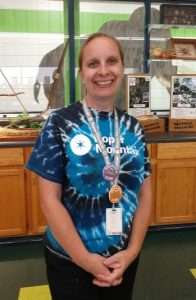
Anne Howell, the “Butterfly Lady”
The exhibit is open Tuesday through Saturday from 9:00 a.m. to 3:00 p.m., closed only on the 4th of July. Admission is: $8 for teens and adults (ages 13-59); $7 for children (ages 4-12) and for senior citizens (age 60 and over). Free for children age 3 and under, Roper Mountain Science Center members, and school district employees.
 Want even more butterfly adventure? Three special Monday Butterfly Bonanza parent/child events will take place on June 17th, June 24th, and July 8th, from 10:00-11:00 a.m. The Butterfly Bonanza ticket ($40 for a parent and one child) includes a special butterfly-themed craft and sweet treat.
Want even more butterfly adventure? Three special Monday Butterfly Bonanza parent/child events will take place on June 17th, June 24th, and July 8th, from 10:00-11:00 a.m. The Butterfly Bonanza ticket ($40 for a parent and one child) includes a special butterfly-themed craft and sweet treat.
And, of course, year-round, the butterfly garden outside of Harrison Hall contains plants that attract butterflies and bees. In 2002, it was certified as a National Wildlife Federation Schoolyard Habitat.
While you’re there, you’ll want to explore the rest of the Harrison Hall of Natural Science, the nature trails, living history farm, and much more.
Article by Sharon Purvis

Jan 28, 2019 | Education, Human Potential, Staying on Top
by Sharon Purvis
One of Ten at the Top’s focus areas for 2019 will be convening various stakeholders to address what is becoming a serious problem in South Carolina: a shortage of teachers to meet the growing demand.
Working with Ten at the Top to spearhead this initiative is Ansel Sanders, president and CEO of Public Education Partners, whose mission is “to lead our community in acting collectively to support, strengthen and advance public education and student achievement in Greenville County Schools.” That mission positions Sanders ideally to gather interested parties to address the shortage.
student achievement in Greenville County Schools.” That mission positions Sanders ideally to gather interested parties to address the shortage.
Ten at the Top has for some time been convening district superintendents and business leaders in the Upstate, but it has been with a workforce development focus in the past. The group evolved to include leaders in higher education in an effort to bridge the gap between K-12 and higher education institutions.
After several meetings with representatives from those three sectors, it became clear that the state’s teacher shortage—which is only projected to worsen if steps are not taken to address it—is an issue that needs focused attention.
The problem is two-pronged: the over-all student population in South Carolina public schools has grown by an average of 7,400 students per year over the last 5 years, and higher turn-over and fewer teacher graduates means a diminishing supply of teachers to meet the demand. (For an in-depth analysis of the issue, click here.)
In an effort to get their arms around what is needed to tackle this issue, the group began by forming three committees to address the following:
- Understanding the challenge—why is there a shortage? What are teachers actually saying?
- Thinking about elevating the profession. How do we better tell the story of teachers? This a marketing strategy, both to potential teachers and the public.
- Thinking specifically about teacher retention and recruitment strategies.
 The first is important because, Sanders says, the shortage is really a symptom of an underlying problem, and without an understanding of what’s causing it, any measures taken to address it will be ineffective—or at least not as effective as they could be. Teacher pay gets a lot of press, but it is far from the only issue. Public perception of teachers and education is also a factor, as is a lack of stature for the profession, and the 2nd and 3rd committees seek to address those issues.
The first is important because, Sanders says, the shortage is really a symptom of an underlying problem, and without an understanding of what’s causing it, any measures taken to address it will be ineffective—or at least not as effective as they could be. Teacher pay gets a lot of press, but it is far from the only issue. Public perception of teachers and education is also a factor, as is a lack of stature for the profession, and the 2nd and 3rd committees seek to address those issues.
The key, says Sanders, is “how to elevate, modernize, and professionalize teaching.” What makes a profession a profession? Compensation is a piece of the puzzle, certainly, but it’s also training and the autonomy to do one’s job, as well as the respect that is afforded to other professions, Sanders says. He continues: “We respect them, but do we respect and honor them the way we do, say, our military, or other highly honored professions? Are we telling our own children that they should aspire to be teachers, or are we not?”
Alternate routes to certification are another piece of the puzzle—not to replace the traditional route through colleges of education, but to supplement it as a source of teachers. An added benefit of that is that the pool of teachers entering the profession will have added diversity, with older teachers who have had other professional experience to draw on.
The three committees are just underway and will meet in January and early February and will report to the larger group, called  the Education Spectrum Forum, in April. Each has 10-12 members, comprised of K-12, higher education, and business sectors. Although Sanders hopes to engage policymakers, the outcome of the committees is not policy recommendations, but the hope is that policy will emerge from the process.
the Education Spectrum Forum, in April. Each has 10-12 members, comprised of K-12, higher education, and business sectors. Although Sanders hopes to engage policymakers, the outcome of the committees is not policy recommendations, but the hope is that policy will emerge from the process.
This group’s efforts are running parallel to legislative efforts, in fact, with education being at the forefront of policy initiatives in Columbia. South Carolina Public Radio reports that Gov. McMaster’s budget recommendation calls for a 5% pay raise for teachers among other things as part of his promise to fix education in the state. The money to pay for the proposed reforms comes from a budget surplus as well as increased tax revenues from a growing economy. And McMaster promised in his State of the State address to sign into law reform bills that have been proposed in the state assembly.
Ten at the Top and Public Education Partners will continue to focus on this issue throughout 2019 and will continue to use this space to update constituents on the progress.

 Upstate SC Alliance launches regional gateway to technical training programs
Upstate SC Alliance launches regional gateway to technical training programs The platform, Skill Up, is a one-stop shop for individuals to explore the earning potential, projected growth, and training programs available for an array of in-demand careers that can be obtained with 12 months or less of technical training. In many cases, financial support is available for these programs.
The platform, Skill Up, is a one-stop shop for individuals to explore the earning potential, projected growth, and training programs available for an array of in-demand careers that can be obtained with 12 months or less of technical training. In many cases, financial support is available for these programs. The platform was created by the Upstate SC Alliance in partnership with the Upstate’s technical colleges: Greenville Technical College, Tri-County Technical College, Spartanburg Community College and Piedmont Technical College.
The platform was created by the Upstate SC Alliance in partnership with the Upstate’s technical colleges: Greenville Technical College, Tri-County Technical College, Spartanburg Community College and Piedmont Technical College. The site emphasizes training programs that can be completed in between two and 12 months, informed by Strada Education Network research.
The site emphasizes training programs that can be completed in between two and 12 months, informed by Strada Education Network research. Skill Up is an extension of the Move Upstate SC website and brand, which were launched in 2019 to attract individuals to professional jobs in the Upstate.
Skill Up is an extension of the Move Upstate SC website and brand, which were launched in 2019 to attract individuals to professional jobs in the Upstate. “Skill Up recognizes that the pandemic’s challenges may present an opportunity for some individuals to pursue new avenues. From hands-on manufacturing roles to network configuration to patient support, these careers have staying power and play an important role in our community.”
“Skill Up recognizes that the pandemic’s challenges may present an opportunity for some individuals to pursue new avenues. From hands-on manufacturing roles to network configuration to patient support, these careers have staying power and play an important role in our community.”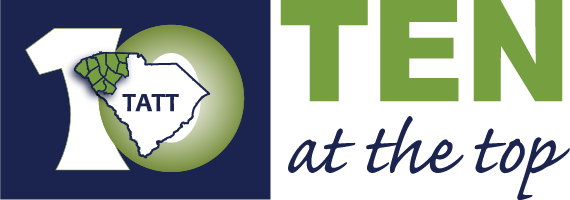


 Saturday’s event kicks off at 10 am and runs until 4 pm. We will have our typical Third Saturday activities, including the operation of the Hagood Mill, living history demonstrations and a cherry picked group of vendors. Visitors and guest performers will participate in the festivities of the day which will include: Native American traditional drumming, singing, dancing, flute playing, storytelling, Cherokee hymns in the Tsalagi Gawonihisdi language, and traditional crafts and demonstrations. Performers include storyteller and basket maker Nancy Basket, from Walhalla, SC; Cherokee singer Amy Sindersine of the Reedy River Inter-tribal Association; The Kau-Ta-Noh-Jrs Society Singers of the Tuscarora Nation, NC with On’yas Locklear, Raniya Locklear and Nawayla Locklear; and Keepers of the Word from South Carolina.
Saturday’s event kicks off at 10 am and runs until 4 pm. We will have our typical Third Saturday activities, including the operation of the Hagood Mill, living history demonstrations and a cherry picked group of vendors. Visitors and guest performers will participate in the festivities of the day which will include: Native American traditional drumming, singing, dancing, flute playing, storytelling, Cherokee hymns in the Tsalagi Gawonihisdi language, and traditional crafts and demonstrations. Performers include storyteller and basket maker Nancy Basket, from Walhalla, SC; Cherokee singer Amy Sindersine of the Reedy River Inter-tribal Association; The Kau-Ta-Noh-Jrs Society Singers of the Tuscarora Nation, NC with On’yas Locklear, Raniya Locklear and Nawayla Locklear; and Keepers of the Word from South Carolina. We will be inaugurating “Our Native Roots: An Interpretive Trail” at noon. The interpretive trail takes visitors along the Old Indian Path, which is an ancient trading path that took the Native Americans from the Mississippi coast and up and through the continental divide to Virginia. The interpretive trail includes a dugout out canoe which will be burned during the Native American Celebration, a river cane restoration area, a sacred fire circle for all to experience on this special day, a medicine wheel garden, a corn garden, a mortar and pestle for grinding corn, a prehistoric stone mortar, an archaeology adventure for kids, the Paul West artifact collection, and the petroglyphs that were made in prehistoric times. We are especially grateful to Paul West, who donated his personal collection of Native American artifacts, art and books to the Hagood Mill Foundation, and are now housed in the Hagood Creek Petroglyph Site.
We will be inaugurating “Our Native Roots: An Interpretive Trail” at noon. The interpretive trail takes visitors along the Old Indian Path, which is an ancient trading path that took the Native Americans from the Mississippi coast and up and through the continental divide to Virginia. The interpretive trail includes a dugout out canoe which will be burned during the Native American Celebration, a river cane restoration area, a sacred fire circle for all to experience on this special day, a medicine wheel garden, a corn garden, a mortar and pestle for grinding corn, a prehistoric stone mortar, an archaeology adventure for kids, the Paul West artifact collection, and the petroglyphs that were made in prehistoric times. We are especially grateful to Paul West, who donated his personal collection of Native American artifacts, art and books to the Hagood Mill Foundation, and are now housed in the Hagood Creek Petroglyph Site. We will kick off the weekend on Friday, November 20th at the Heritage Pavilion! We have special free programming this year thanks to the Traditional Arts Touring Grant from South Arts. Beginning at 5:30 pm we will have an Artifact Show-and-Tell, in addition to workshops from some of the veteran performers of our Native American Celebration! There will be artifact experts on site helping folks to identify artifacts and to share stories.
We will kick off the weekend on Friday, November 20th at the Heritage Pavilion! We have special free programming this year thanks to the Traditional Arts Touring Grant from South Arts. Beginning at 5:30 pm we will have an Artifact Show-and-Tell, in addition to workshops from some of the veteran performers of our Native American Celebration! There will be artifact experts on site helping folks to identify artifacts and to share stories.  Primitive camping will be available Friday and Saturday nights– $10/person aged 13 and up for one or two nights (tent/car camping) or $30 for RV spaces. Limit 6 people per site. Car and RV spaces are limited, so register online soon. Folks with loud generators will be asked not to use them during special events.
Primitive camping will be available Friday and Saturday nights– $10/person aged 13 and up for one or two nights (tent/car camping) or $30 for RV spaces. Limit 6 people per site. Car and RV spaces are limited, so register online soon. Folks with loud generators will be asked not to use them during special events.
 Public Education Partners of Greenville County is proud to serve as co-facilitator with Ten at the Top of the
Public Education Partners of Greenville County is proud to serve as co-facilitator with Ten at the Top of the 

 Adventure
Adventure

 Want even more butterfly adventure? Three special Monday Butterfly Bonanza parent/child events will take place on June 17th, June 24th, and July 8th, from 10:00-11:00 a.m. The Butterfly Bonanza ticket ($40 for a parent and one child) includes a special butterfly-themed craft and sweet treat.
Want even more butterfly adventure? Three special Monday Butterfly Bonanza parent/child events will take place on June 17th, June 24th, and July 8th, from 10:00-11:00 a.m. The Butterfly Bonanza ticket ($40 for a parent and one child) includes a special butterfly-themed craft and sweet treat.
 The first is important because, Sanders says, the shortage is really a symptom of an underlying problem, and without an understanding of what’s causing it, any measures taken to address it will be ineffective—or at least not as effective as they could be. Teacher pay gets a lot of press, but it is far from the only issue. Public perception of teachers and education is also a factor, as is a lack of stature for the profession, and the 2nd and 3rd committees seek to address those issues.
The first is important because, Sanders says, the shortage is really a symptom of an underlying problem, and without an understanding of what’s causing it, any measures taken to address it will be ineffective—or at least not as effective as they could be. Teacher pay gets a lot of press, but it is far from the only issue. Public perception of teachers and education is also a factor, as is a lack of stature for the profession, and the 2nd and 3rd committees seek to address those issues. the Education Spectrum Forum, in April. Each has 10-12 members, comprised of K-12, higher education, and business sectors. Although Sanders hopes to engage policymakers, the outcome of the committees is not policy recommendations, but the hope is that policy will emerge from the process.
the Education Spectrum Forum, in April. Each has 10-12 members, comprised of K-12, higher education, and business sectors. Although Sanders hopes to engage policymakers, the outcome of the committees is not policy recommendations, but the hope is that policy will emerge from the process.